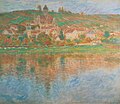This article needs additional citations for verification .(September 2014) |
 Von der Heydt Museum | |
 Interactive fullscreen map | |
| Location | Wuppertal, Germany |
|---|---|
| Coordinates | 51°15′26″N7°8′48″E / 51.25722°N 7.14667°E |
The Von der Heydt Museum is a museum in Wuppertal, Germany.
Contents
The Von der Heydt Museum includes works by artists from the 17th century to the present time.





